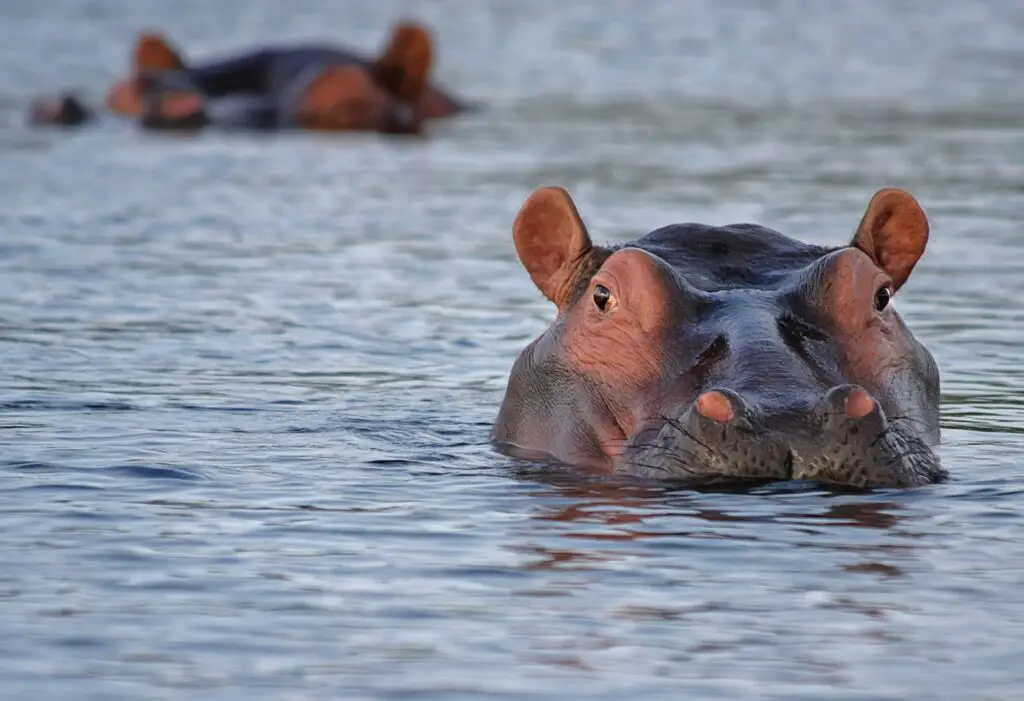How Hippopotamus breathe? Why do they stay underwater?
How Hippopotamus breathe?
Hippos are amphibious animals that spend the majority of their time in water, and they have evolved a distinct breathing pattern to accommodate their semi-aquatic lifestyle.
When a hippo goes underwater, its nostrils close and it can hold its breath for up to five minutes. When it needs to breathe, it will come to the surface and take a deep breath through its nostrils before returning to the depths.
Hippos can also breathe while walking or standing in shallow water by creating a snorkel-like effect with their nostrils.
Hippos are semi-aquatic mammals, which means they spend time both in and out of the water.
Because of their amphibious lifestyle, they have developed unique adaptations in their respiratory system that allow them to breathe efficiently in both environments.
When submerged in water, a hippo’s nostrils close tightly to prevent water from entering its respiratory system.
Hippos can hold their breath for several minutes at a time, allowing them to stay underwater for long periods of time while foraging, resting, or evading predators.
When a hippo needs to breathe, it will rise to the surface of the water, eyes and ears submerged, and open its nostrils to take in air.
The nostrils of the hippo are located at the top of its snout, allowing it to breathe while keeping the majority of its body submerged.
Hippos can breathe while walking or standing in shallow water, which is unusual. They will do this by using their nostrils as a snorkel to keep their head above water while allowing air to flow in and out of their respiratory system.
Hippos have evolved a respiratory system that allows them to breathe efficiently both in and out of water, allowing them to adapt to their semi-aquatic lifestyle.
Their ability to hold their breath for extended periods of time and to use their nostrils as a snorkel when necessary are important adaptations that allow them to survive in their unique environment.

Why do hippos stay underwater?
Hippos are semi-aquatic creatures that spend a lot of time in the water. Hippos prefer to stay underwater for a variety of reasons, including:
Sun protection: Hippos are extremely sensitive to the sun’s rays, and prolonged exposure can cause their skin to dry out and crack. Hippos can protect their skin from the sun and keep it moisturized by staying in the water.
To keep cool: Hippos are large, heavy animals that produce a lot of heat. They can regulate their body temperature and stay cool by staying in the water, especially during the hot daytime hours.
Foraging: Hippos are herbivores that primarily eat grass. They can access vegetation that grows in or near the water by staying in the water, which may not be available on land.
Escape from predators: Hippos are extremely powerful creatures that can become aggressive when threatened. They are, however, prey to predators such as lions, hyenas, and crocodiles. They can avoid land-based predators by remaining in the water.
To summarise, hippos stay underwater to protect their skin from the sun, to regulate their body temperature, to forage for food, and to avoid predators. Their semi-aquatic lifestyle is an important adaptation that allows them to survive in their natural environment.
How do Hippos breathe while sleeping?
Hippos are semi-aquatic mammals that can sleep on land or in the water.
Hippos have developed a unique adaptation that allows them to continue breathing while partially submerged in water while sleeping.
When a hippo sleeps in the water, it usually positions its body so that its head and ears are above the surface while the rest of its body is submerged. This allows the hippo to breathe through its nostrils at the tip of its snout.
Hippos can hold their breath for several minutes at a time, allowing them to stay submerged while sleeping for short periods of time without needing to come up for air.
If a sleeping hippo needs to take a breath, it will instinctively rise to the surface of the water and inhale air through its nostrils before returning to its sleeping position.
Hippos can sleep for long periods of time on land, usually with their heads resting on their bodies or the ground.
Hippos will continue to breathe through their nostrils while sleeping on land, just as they would when awake.
Overall, hippos have adapted to their semi-aquatic lifestyle by developing unique respiratory adaptations that allow them to breathe efficiently in both water and on land, even while sleeping.
Do hippos breathe underwater or, they are just able to hold their breath underwater?
Hippos cannot breathe underwater, but they can hold their breath for several minutes while submerged.
Hippos are semi-aquatic mammals that spend a significant amount of time in water, but they are not adapted for underwater respiration like whales, dolphins, and seals.
When a hippo dives underwater, its nostrils close to prevent water from entering its respiratory system.
Hippos can hold their breath for up to five minutes, allowing them to stay underwater for long periods of time while foraging, resting, or evading predators.
When a hippo needs to breathe, it will surface and open its nostrils to take in air before submerging again.
The nostrils of the hippo are located at the top of its snout, allowing it to breathe while keeping the majority of its body submerged.
Hippos cannot breathe underwater, but they have adapted to their semi-aquatic lifestyle by developing a respiratory system that allows them to hold their breath for extended periods while submerged and breathing efficiently while on the surface.
How long can a hippo swim and hold its breath?
Hippos are semi-aquatic mammals that spend a significant amount of time in both water and on land.
They are not adapted for underwater respiration like some aquatic mammals, but they can hold their breath for extended periods of time while submerged.
Hippos can hold their breath for up to five minutes while submerged on average, but some have been known to hold their breath for up to six minutes.
Hippos, despite their bulky bodies, are surprisingly good swimmers. They can swim at speeds of up to 8 km/h (5 mph) and cover a distance of several kilometres in water without pausing.
However, it is important to note that hippos are not built for long periods of swimming and prefer to spend the majority of their time in the water resting or wallowing.
Swimming long distances can be exhausting for them, and if they get too far away from shore, they may become vulnerable to predators.
In summary, hippos are capable of holding their breath for up to five minutes while submerged and can swim at moderate speeds for short distances, but they usually prefer to spend most of their time in the water by resting or wallowing.
Can Hippos sleep underwater?
Yes, hippos can and frequently do sleep underwater. Hippos are semi-aquatic mammals that spend most of their time in the water, so sleeping underwater is not uncommon.
When a hippo sleeps in the water, it usually positions its body so that its head and ears are above the surface while the rest of its body is submerged. This allows the hippo to breathe through its nostrils at the tip of its snout.
Hippos can hold their breath for several minutes at a time, allowing them to stay submerged while sleeping for short periods of time without needing to come up for air.
If a sleeping hippo needs to take a breath, it will instinctively rise to the surface of the water and inhale air through its nostrils before returning to its sleeping position.
While sleeping on land is also common for hippos, sleeping underwater provides them with a cool, comfortable place to rest while also protecting them from predators.
Overall, hippos can and do sleep underwater, and their unique respiratory adaptations allow them to breathe efficiently even while submerged.
Do hippos eat underwater?
Hippos do not eat underwater because they are not adapted to do so. Despite being excellent swimmers, they lack the ability to capture and consume prey underwater, as some aquatic animals do.
Hippos, on the other hand, feed on land or in shallow water, where they can easily graze on vegetation or browse on trees and bushes. They are herbivores that primarily feed on grass, which they consume in large quantities every day to meet their nutritional needs.
Hippos have been observed grazing for several hours per day, primarily in the evenings and at night when temperatures are cooler.
They crop grass with their large, powerful jaws and teeth, and they can consume up to 68 kg (150 lb) of vegetation in a single day.
While hippos do not eat underwater, they do spend a lot of time in the water, which helps them stay cool and hydrated.
They are also known to consume aquatic plants and algae that grow in the water and can be easily reached without fully submerging themselves.
While hippos do not eat underwater, they can consume a variety of plant material on land as well as in shallow water where they can easily reach their food.
